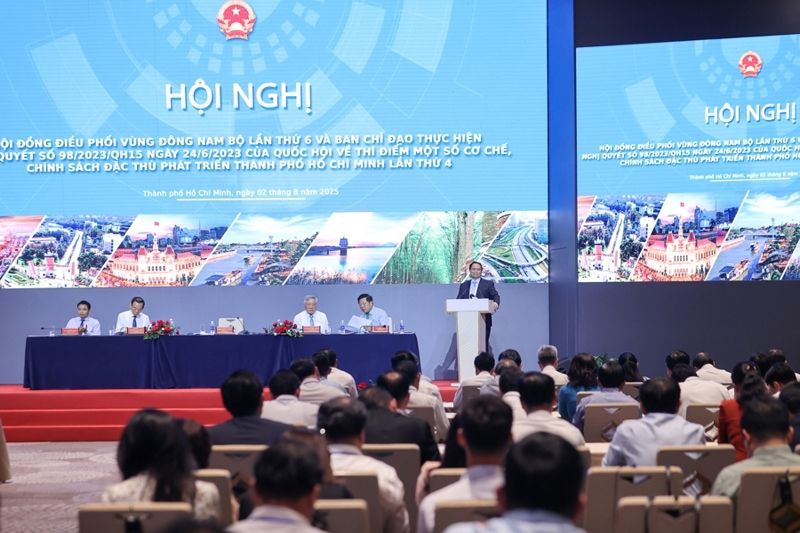Prime Minister Pham Minh Chinh has stressed that Ho Chi Minh City (HCMC) and the broader Southeast region of the country possess a new space for development and must act more decisively to maintain their role as the nation's economic locomotive and primary growth pole.
He called on the region to lead the way in innovation, digital transformation, and sustainable development.
The PM made the statement at the 6th Conference of the Southeast Region Coordinating Council on August 2, held concurrently with the 4th meeting of the Steering Committee for the implementation of National Assembly Resolution No. 98/2023/QH15 on piloting specific mechanisms and policies for HCMC's development.
The Prime Minister's call comes in the context of a major administrative restructuring of the region, with the two-tier local government model, consisting of city/provincial-level and ward/commune-level administrative units, taking effect on July 1, 2025.
Following the administrative boundary realignment, the Southeast region now consists of three main administrative units: a new Ho Chi Minh City, formed by merging the former HCMC with the former provinces of Ba Ria - Vung Tau and Binh Duong; a new Dong Nai province, formed by merging the former provinces of Dong Nai with Binh Phuoc; and a new Tay Ninh province, formed by merging the former provinces of Tay Ninh and Long An.
The region holds a position of special importance, serving as the country's primary economic engine and a key growth pole for national development.
Specifically, the newly formed HCMC has become the largest "mega-city" in the country, designed to follow a multi-center, integrated, and sustainable development model. The city now spans 6,773 sq.km with a population of 14 million. Its Gross Regional Domestic Product (GRDP) is approximately $113 billion, accounting for 23.6% of the nation's GDP and cementing its role as a critical growth driver for Vietnam.
The newly restructured Southeast region now spans over 28,000 sq.km, with a population of nearly 21 million and a population density of 749 people per sq.km. Its total Gross Regional Domestic Product (GRDP) exceeds $150 billion.
In the first six months of 2025, the Southeast region's GRDP is estimated to have grown by 7%. Export value reached $115.7 billion, accounting for 31% of the national total. The region continues to lead the country in both the number of foreign direct investment (FDI) projects and total registered FDI capital, with nearly 24,000 projects and over $210 billion.
Furthermore, HCMC has been a pioneer in new development models, including export processing zones, high-tech parks, and development investment funds, which have created powerful breakthroughs in socio-economic development and international integration. The former city's GRDP grew by 6.56% in the first six months of 2024.
The PM said he expected that the Southeast region will set an example by leading breakthroughs in science and technology, innovation, and digital transformation. He urged the region to successfully implement the Politburo's four resolutions on the "four pillars" and ensure the smooth and seamless operation of the new two-tiered local government system.
Regarding specific tasks for HCMC, PM Chinh directed the city to continue reviewing, further specifying, and implementing Resolution No. 98/2023/QH15. He emphasized that HCMC must demonstrate greater determination, make stronger efforts, and take more decisive action to leverage its special mechanisms and policies more effectively, guided by the spirit of "leading in five key areas."
First, to pioneer digital transformation, the development and application of science and technology, the promotion of startups and innovation, and smart city development.
Second, to pioneer the attraction of investment into high-tech and green industries, in line with sustainable development.
Third, to pioneer the development of high-value-added finance, services, and tourism sectors, as well as the marine economy.
Fourth, to pioneer the development of high-quality human resources and leading experts in key fields.
Fifth, to pioneer the implementation of social policies and the provision of social welfare.









 Google translate
Google translate